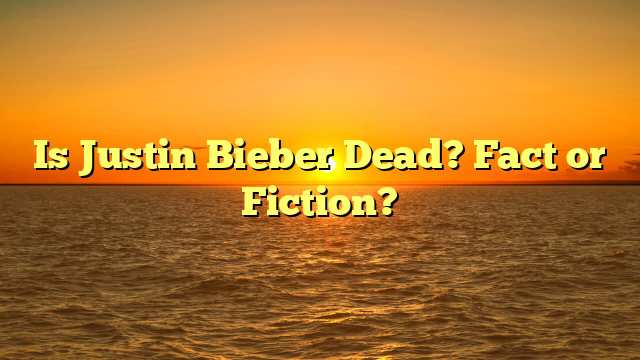## Is Justin Bieber Dead? Fact or Fiction? Unraveling the Persistent Rumor Mill
The internet is a wild, wild west. A place where information spreads at lightning speed, regardless of its accuracy. And few celebrities have been subjected to more outlandish online rumors than Justin Bieber. One of the most persistent, and frankly bizarre, claims that circulates periodically is the assertion that Justin Bieber is dead. This article will delve into this persistent rumor, examining its origins, dissecting the “evidence” often presented, and ultimately proving its complete falsity.
### The Genesis of the Rumor: How Conspiracy Theories Take Root
The exact origin of the “Justin Bieber is dead” rumor is difficult to pinpoint. Like many online conspiracy theories, it likely started with a single, unsubstantiated claim, perhaps on a less reputable forum or social media platform. This initial seed then spread like wildfire, amplified by various factors:
* Clickbait: Sensational headlines designed to generate clicks are a major contributor. Websites and social media accounts profit from views and engagement, regardless of the truthfulness of their content. Headlines hinting at shocking celebrity deaths are inherently click-worthy.
* Misinformation and Disinformation: Deliberate spreading of false information (disinformation) and accidental sharing of inaccurate information (misinformation) both contribute to the perpetuation of the rumor. Once a rumour gains traction, it’s difficult to contain.
* Lack of Media Literacy: Many people lack the critical thinking skills to discern reliable sources from unreliable ones. They may passively accept information presented online without verifying its authenticity.
* The Power of the Meme: Sometimes a rumor is propelled by a visual meme or a short video clip taken out of context. This visual element can make the rumour seem more convincing and easier to share.
### Debunking the “Evidence”: A Critical Examination
Those who believe in the rumor often cite various “pieces of evidence.” Let’s examine them critically:
1. The “Mysterious Absence” Argument: Proponents often point to periods where Bieber has been less visible in the public eye, citing this as proof of his death. However, celebrities take breaks. They have personal lives, need time off, and can choose to limit their public appearances. A period of relative quietness is not evidence of death.
2. The “Doppelganger” Theory: This theory suggests that the person currently seen in public isn’t the real Justin Bieber but a look-alike. This is purely speculation fuelled by a lack of familiarity with the natural aging process and stylistic changes. Bieber’s appearance has evolved over time, just like any other human being.
3. Fabricated News Articles and Social Media Posts: False articles and social media posts pretending to be from legitimate news outlets are frequently cited as “proof.” However, a quick fact check reveals these sources are fake, often easily identifiable through poor grammar, illogical writing, and a lack of verifiable information.
4. The “Conspiracy” Angle: Some theories connect Bieber’s supposed death to a larger conspiracy involving powerful individuals or organizations. These are purely baseless and speculative narratives lacking any credible evidence.
### The Abundant Counter-Evidence: Bieber’s Continued Public Presence
The overwhelming evidence contradicts the claim of Bieber’s death. He consistently appears in public, engages with fans on social media, releases music, and participates in various events. His presence on social media, his constant touring and appearances are powerful refutations of the rumour. Furthermore, reputable news outlets would have widely reported on such a significant event. The absence of any such reporting from trusted news sources should be a clear indication of the rumor’s falsity.
### Conclusion: Spreading Falsehoods and the Importance of Critical Thinking
The persistent rumor of Justin Bieber’s death is a prime example of how easily misinformation spreads online. It highlights the critical need for media literacy and critical thinking skills. Before accepting any information, especially sensational claims, it’s vital to verify its source and check for corroborating evidence from reputable sources. The overwhelming evidence – his continued presence, lack of reputable news reporting, and the fabricated nature of the supporting “evidence” – conclusively proves that the rumour is entirely false. The next time you encounter a sensational claim online, remember to approach it with skepticism and apply your critical thinking skills before sharing it with others. Spreading false information has real consequences, damaging reputations and undermining public trust. Let’s strive for a more informed and responsible online environment.

